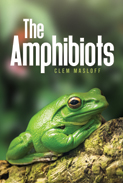
 |
The strange world of Caecilia is home to both factions of the religious cult collectively known as Amphibiots. The two denominations were formed when a schism within the cult occurred over whether to worship the frog or the salamander, resulting in the formation of the Anuran and the Salamandrine sects. Ranid Rolius is on a mission to prove that the Salamandrine Doctrine is the first and true doctrine of the Amphibiots, making his sect's ancestors “the genuine, orthodox believers” and the Anuran dissenters ones who “revolted, straying from the true track. . .” Ranid intends to access the Salamandrine archives by becoming a research assistant in hopes of discovering the truth about his religion through a careful reading of the religion’s founder, Alsike Caldus. The prospect is intriguing to Praeposter Hyle Xalus who sees it as a way to gain the upper hand in the tensions between the sects.
Masloff’s novel is a fascinating read about the nature of mankind, especially when it comes to spirituality and the concept of a creator, or what Caldus’s discovered diary entries refer to as the odyle, “an abstract, distant force beyond human perception or understanding.” At the time of the Amphibiots’ founding, this was “understood as unknown, invisible, and ineffable,” rendering it a subject few believers embraced. However, the founder noted that folklore and the “supernatural attributes of amphibians in Caecilia” were very much on the minds of the people. Ranid’s quest for truth takes him in unexpected directions, and the truth he uncovers about the Amphibiots has the potential to disrupt both sects and change everything they thought to be true. With such a powerful discovery, Ranid learns another truth: not all things are as they seem. Evil awaits him, and he must flee. He becomes involved with some of the Anuran persuasion and becomes convinced that the two denominations must join together, incorporating the best aspects of both.
Masloff’s tale is a fascinating look into the folklore and the worship of amphibians by ancient cultures. Though a fictional work, the author’s research and attention to detail give the book the authoritative feel found in the works of great historical writers. There is much about human nature tackled by Masloff within the work and, particularly, the duality of mankind. Characters appear pious or sincere only to be uncovered as hypocrites. Parallels are obvious between the modern state of religion and politics with intriguing and disturbing consequences in regard to the protagonist’s discoveries.
A master storyteller, the author, who taught himself to read in the early 1940s, has read and written speculative fiction and science fiction ever since. In an interview on This Week in America with Ric Bratton, the author reveals he was a linguist and translator of four Baltic languages in the Army, a teacher of sociology for decades, and a researcher of Baltic folklore. His enthusiasm for his work is refreshing, and he brings a unique perspective to the genre of science fiction through his presentation of an alien setting with “real world” characters and conflicts. This skillful approach along with the author’s love of talking with fans to ascertain ways to improve his work make for an enjoyable and unpredictable storyline, giving the reader much to ponder. Now retired from teaching, Masloff is prolific in pursuing his dream of being an author with several books in print including Psychographia, Galatic Minds, and Diploids. The Amphibiots is smart, thoughtful, unique, and entertaining—one of those reads that keeps giving long after the final page has been turned.
RECOMMENDED by the US Review